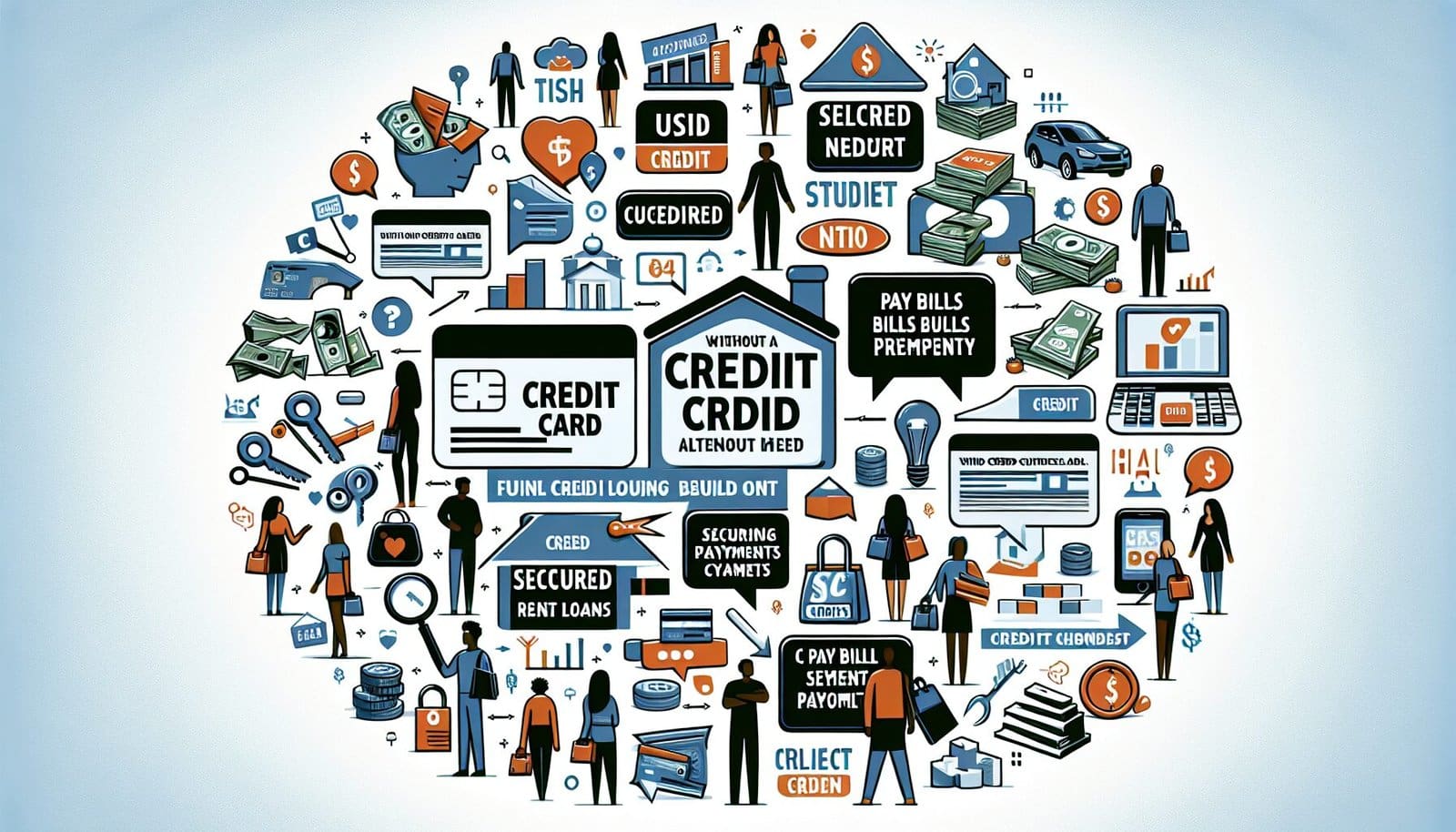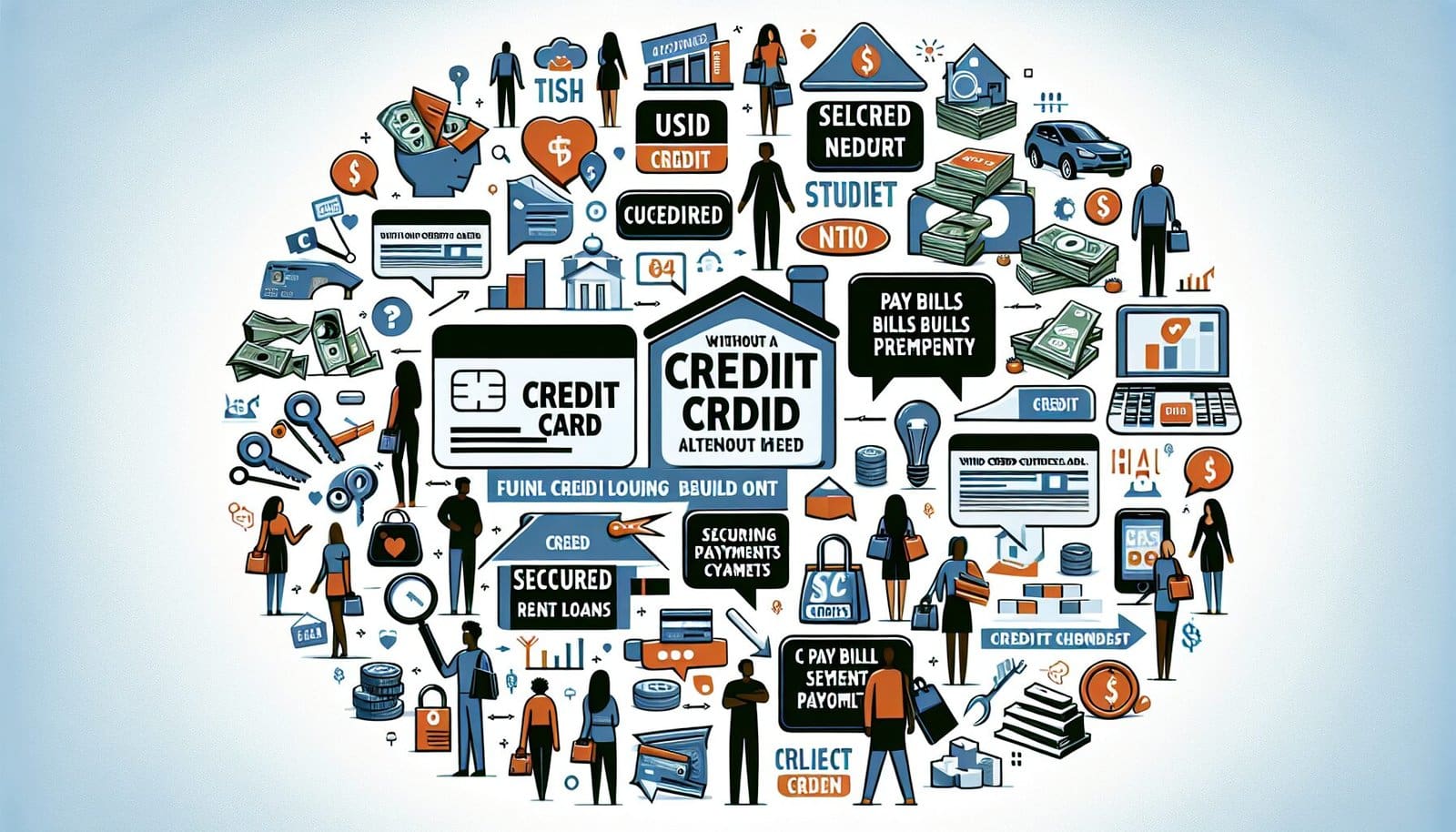As a student, you may find yourself in a bit of a conundrum when it comes to building credit without a credit card. It's no secret that having a good credit score is essential for future financial endeavors, but what can you do if you don't have access to a credit card? Don't worry, because in this article, we will share some foolproof strategies that will help you establish credit even without a credit card. Whether you're a college freshman or a high school student, these tips will set you on the right path towards a strong credit history. So let's dive in and explore some credit-building tactics that don't require a credit card!

Introduction
Building credit is an essential part of establishing a strong financial foundation. As a student, you may not have a credit card yet, but that doesn't mean you can't start building credit. In this article, we will explore various methods you can utilize to build credit without a credit card. By understanding the importance of credit scores, exploring alternative credit-building options, and learning how to monitor and maintain good credit, you can set yourself up for future financial success.
Understanding Credit Scores
What is a Credit Score?
A credit score is a numerical representation of your creditworthiness. It is a three-digit number that lenders use to assess your credit risk when you apply for loans or credit cards. Credit scores typically range from 300 to 850, with higher scores indicating better creditworthiness.
Why is a Credit Score Important?
Credit scores play a crucial role in your financial life. They determine whether you qualify for loans, credit cards, or even rental properties. Lenders use credit scores to determine the interest rates they offer you, meaning a higher credit score can result in lower interest rates and potentially save you thousands of dollars over time. Additionally, credit scores can influence insurance premiums and even impact your employment prospects.
How is a Credit Score Calculated?
Several factors contribute to the calculation of your credit score. The most significant factors include your payment history, amounts owed, length of credit history, new credit accounts, and the types of credit used. Each factor carries a specific weight, and understanding these factors can help you make informed decisions to improve your credit score.
Importance of Building Credit as a Student
Building credit as a student is crucial for future financial endeavors. Once you graduate, you may need a good credit score to secure affordable financing for a car, a home, or to pursue higher education. Additionally, a good credit score can make it easier to rent an apartment, qualify for insurance or even secure that dream job. By starting early and building a positive credit history now, you are setting yourself up for success in the long run.
Alternative Credit Building Options
While credit cards are a common method used to build credit, as a student without a credit card, there are still several effective alternative credit-building options available to you.
Using a Student Loan
One option to consider is utilizing student loans to build credit. By responsibly borrowing and making timely repayments, you can demonstrate your ability to handle credit responsibly. Student loans are typically more accessible to students with limited credit history, making them an ideal option for credit building.
Authorized User on a Parent's Credit Card
Another option is becoming an authorized user on a parent's credit card. This allows you to benefit from their credit history and responsible credit card usage. However, it's crucial to work with a trusted family member who is responsible and has a good credit history. By being an authorized user, their positive credit behavior can positively impact your own credit history.
Secured Credit Cards
Secured credit cards are a great option for students looking to build credit from scratch. These cards require a security deposit, which serves as collateral for the card. Using a secured credit card responsibly by making timely payments can help establish a positive credit history. Over time, you may be able to upgrade to an unsecured credit card.
Rent Reporting Services
Rent reporting services offer an innovative way to build credit as a student. These services report your rent payments to credit bureaus, allowing you to establish a credit history based on your rental payments. By consistently paying your rent on time, you can demonstrate creditworthiness and build a positive credit profile.

Building Credit with Student Loans
Understanding Student Loans
Student loans are financial aid offered to students to assist with education-related expenses. They can be federal loans, provided by the government, or private loans, provided by banks and other lenders. When it comes to credit-building, it's important to understand the different types of student loans and their repayment terms.
Timely Loan Repayments
Making timely loan repayments is essential for building credit with student loans. Payment history is a significant factor in credit score calculations, so ensuring you make all payments in full and on time is crucial. By consistently meeting your repayment obligations, you can establish a positive credit history and demonstrate responsibility to future lenders.
Consolidation and Refinancing Options
If you have multiple student loans, consolidation or refinancing may be worth considering. Consolidation involves combining multiple loans into a single loan, simplifying repayment. Refinancing, on the other hand, allows you to obtain a new loan with improved terms and potentially lower interest rates. Both consolidation and refinancing can help you manage your student loans effectively and potentially improve your credit score.
Becoming an Authorized User on a Parent's Credit Card
Working with a Trusted Family Member
If you choose to become an authorized user on a parent's credit card, it's crucial to work with a trusted family member. Ensure that they have a good credit history and a responsible approach to credit card usage. By being added as an authorized user, their positive credit behavior can help boost your credit score and establish a solid credit history.
Understanding the Risks
While becoming an authorized user can be beneficial for credit-building, it's essential to understand the risks involved. As an authorized user, you share the responsibility for any charges made on the card. If the primary cardholder fails to make payments or racks up excessive debt, it can negatively impact your credit score.
Monitoring Credit Activity
As an authorized user, it's important to monitor your credit activity regularly. By keeping an eye on your credit report and ensuring that the primary cardholder is using the credit card responsibly, you can address any issues promptly. Regular monitoring allows you to maintain control over your credit profile and take corrective action if necessary.
Credit Building Strategies for Students without a Credit Card
Using Secured Credit Cards
What are Secured Credit Cards?
Secured credit cards are a type of credit card that requires a security deposit to be held as collateral. The credit limit on a secured credit card is typically equal to the security deposit. They are designed to help individuals establish or rebuild their credit history.
How Secured Credit Cards Work
When you open a secured credit card, you provide a cash deposit as collateral. This deposit acts as security in case you fail to repay your credit card balance. Your credit limit is usually equal to the amount of the deposit. By using the card responsibly and making on-time payments, you can build a positive credit history.
Choosing the Right Secured Credit Card
When selecting a secured credit card, it's important to consider the terms and conditions. Look for a card with a low annual fee, reasonable interest rates, and a reputable issuer. Some secured credit cards also offer the opportunity to transition to an unsecured credit card after a certain period of responsible card usage.
Using and Managing the Secured Credit Card
To build credit effectively with a secured credit card, use it responsibly. Make small purchases each month and pay off the balance in full and on time. Avoid overspending and keep your credit utilization ratio low. By demonstrating responsible usage, you can establish a positive credit history and potentially qualify for an unsecured credit card in the future.
Utilizing Rent Reporting Services
How Rent Reporting Services Work
Rent reporting services are third-party platforms that report your rental payment history to credit bureaus. These services allow you to build credit based on the timely payment of your rent. By signing up for a rent reporting service and having your rental payments reported, you can establish a positive credit history without needing a credit card.
Benefits of Rent Reporting
Using rent reporting services offers several benefits for building credit. Firstly, it allows you to demonstrate a positive credit history based on your responsible rent payments. Secondly, it can help individuals who may not have other traditional credit sources, such as credit cards or loans. Lastly, it provides an opportunity to build credit even if your landlord does not typically report rental payments to credit bureaus.
Choosing a Reliable Rent Reporting Service
When selecting a rent reporting service, it's important to choose a reliable and reputable provider. Look for a service that reports to all major credit bureaus and has positive customer reviews. Research the service's fees and ensure they align with your budget and credit-building goals.
Managing Rent Payments for Credit Building
To effectively build credit using rent reporting services, it's crucial to make all rental payments on time. Treat your rent payments as you would any other bill and ensure they are paid promptly. By consistently meeting your rental obligations, you can create a positive credit history and demonstrate your reliability.
Credit Building Strategies for Students without a Credit Card
Building Credit with Other Financial Products
Using Installment Loans
In addition to student loans, utilizing installment loans can also help build credit. Installment loans, such as personal loans or auto loans, involve borrowing a specific amount of money and repaying it over a fixed period in regular installments. Making timely payments on these loans can demonstrate your ability to manage credit responsibly and help build a positive credit history.
Building Credit with Store Credit Cards
Store credit cards can also be an option for building credit as a student. These cards are typically easier to qualify for compared to traditional credit cards and often come with lower credit limits. By using a store credit card responsibly and making timely payments, you can establish a positive credit history.
Credit Builder Loans
Credit builder loans are specifically designed to help individuals build or rebuild credit. These loans work by holding the loan amount in a savings account or certificate of deposit. You make regular payments on the loan, and once it is paid off, you receive the funds. Credit builder loans provide an opportunity to establish a positive payment history and build your credit.
Paying Bills on Time
While not a specific financial product, paying your bills on time is a fundamental aspect of building credit. Whether it's your phone bill, utility bills, or any other regular payments, being punctual with your payments demonstrates your financial responsibility. Aim to pay all your bills in full and on time to build a positive credit history.
Monitoring and Maintaining Good Credit
Building credit is an ongoing process, and it's important to monitor and maintain good credit habits to ensure long-term success.
Checking Credit Reports Regularly
Regularly checking your credit reports is essential for monitoring your credit health. By reviewing your reports, you can identify any errors or fraudulent activity that may affect your credit score. You are entitled to a free copy of your credit report from each of the major credit bureaus annually.
Correcting Errors on Credit Reports
If you find any errors on your credit reports, it's vital to address them promptly. Contact the credit bureau reporting the error and provide any necessary documentation to support your claim. By successfully disputing and correcting errors, you can ensure that your credit report reflects accurate information.
Avoiding Excessive Credit Applications
While it's important to utilize credit to build a history, it's crucial to avoid excessive credit applications. Each time you apply for credit, it generates a hard inquiry on your credit report, which can temporarily lower your credit score. Be selective in your credit applications and only apply for credit when necessary.
Maintaining a Low Credit Utilization Ratio
Credit utilization ratio is the percentage of your available credit that you are currently using. Maintaining a low credit utilization ratio is important for building good credit. Aim to keep your credit utilization below 30% to demonstrate responsible credit usage.
Building a Positive Credit History
A key aspect of maintaining good credit is building a positive credit history over time. By consistently making on-time payments, avoiding delinquencies, and responsibly managing your credit accounts, you can establish a solid credit history. This history will serve you well when applying for loans, renting apartments, and pursuing other financial endeavors in the future.
In conclusion, as a student without a credit card, there are plenty of alternative options available to build credit. By understanding the importance of credit scores, exploring various credit-building options, and adopting good credit practices, you can establish a strong foundation for your financial future. Start building credit today and reap the benefits tomorrow.
Credit Building Strategies for Students without a Credit Card





